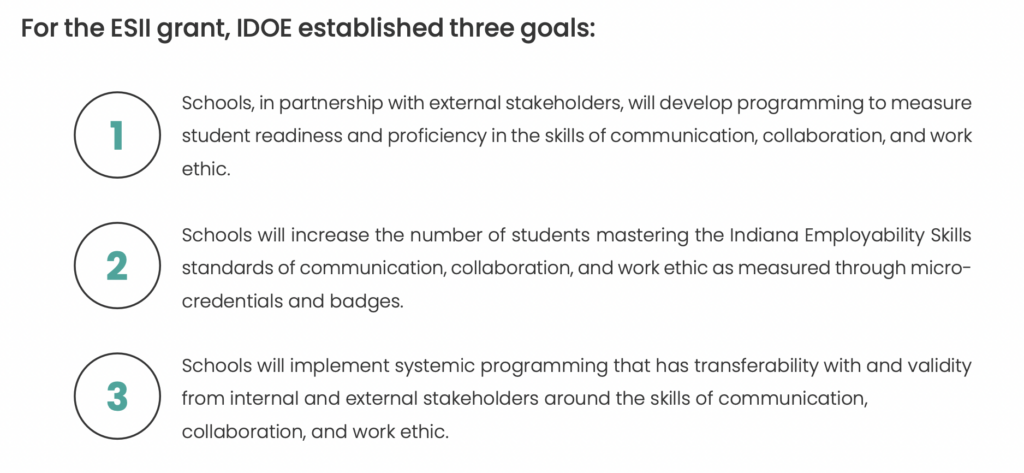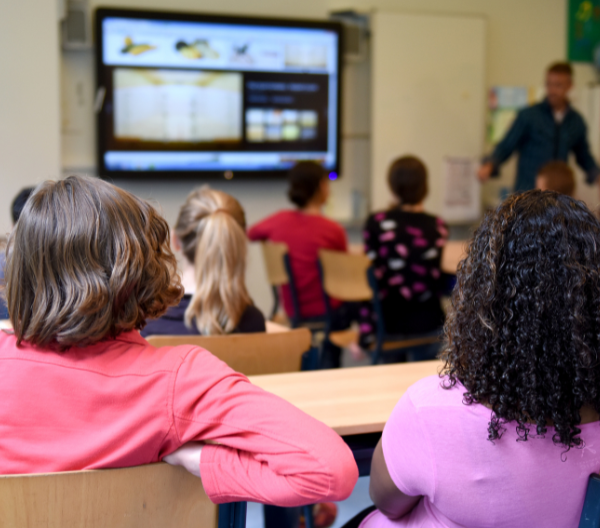In today’s rapidly evolving job market, academic excellence alone is no longer sufficient to ensure success. Employers increasingly seek candidates who possess a diverse set of skills beyond technical knowledge. Recognizing this shift, the Indiana Department of Education (IDOE) launched the Employability Skills Innovation and Implementation (ESII) Grant, with the goal of better preparing students for postsecondary success.
Aiming to inspire schools, districts, and state education leaders across the country to undertake similar initiatives, IDOE partnered with America Succeeds and Learner-Centered Collaborative to document the process. Let’s delve into our comprehensive case study exploring Indiana’s journey, lessons, and opportunity to empower its future workforce.
A Re-envisioning in Indiana

With a population of over 6.8 million and a diverse economic base encompassing sectors such as manufacturing, education, and healthcare, Indiana presents a dynamic backdrop for educational innovation. State leaders are driven by a vision of all students prepared for postsecondary success, whatever their chosen path. In 2022, IDOE launched the ESII pilot grant, a testament to their commitment to this vision, recognizing the need for students to have both academic and employability skills.
Employability skills fall under what America Succeeds calls, “Durable Skills.” Durable Skills include a combination of knowledge and practical application – skills like critical thinking, communication, collaboration, and creativity. In a 2021 report on Durable Skills in Indiana, an analysis of 1.6 million job postings revealed that 1.2 million Indiana jobs required at least one Durable Skill, and six out of the top 10 most requested skills across all postings were identified as Durable Skills.
Collaborating with Grantees & Employers
58 schools across Indiana were awarded grants to integrate three key employability skills: collaboration, communication, and work ethic. Learner-Centered Collaborative, in partnership with IDOE, spearheaded efforts to amplify early innovators, catalyzing statewide transformation. Through this iterative process, the playbook was refined to showcase progress over perfection, fostering a culture of continuous improvement and innovation in employability skills education. This playbook provides state, district, and school leaders with up-to-date strategies, tools, and resources to drive effective implementation of employability skills initiatives.
IDOE recognized the value of employers’ perspectives in ensuring the state’s educational preparation is reflective of and adaptive to employer feedback. Through workshops facilitated by America Succeeds and the Indiana Chamber of Commerce, over 60 participants from diverse industries shared their perspectives on employability skills. Employers expressed a strong preference for candidates with demonstrated experience using these skills in real-world settings, highlighting the importance of practical application in addition to classroom learning.
Lessons Learned and Future Directions
The findings from the ESII grant evaluation conducted by Chamberlin/Dunn highlight the diverse approaches grantees used to foster the development of employability skills among students. From hands-on career awareness kits in elementary grades to service-based projects and work-based learning opportunities in secondary education, schools implemented a range of strategies to prepare students for the workforce. Grantees engaged a multitude of partners and utilized grant funds effectively to support their efforts in integrating employability skills into school curricula and programs.
The evaluation of the ESII grant also uncovered hurdles and important lessons:
Invest time and resources: Developing effective Employability Skills programming requires significant foundational work and ongoing support.
Measure proficiency: While there is agreement on the importance of measuring proficiency in employability skills, there is a need for clarity on how to do so in a standardized manner. It’s essential to establish clear guidelines for assessment.
Provide assessment options: Given the lack of definitive outcomes data, IDOE should offer a menu of assessment options for schools to choose from, along with grade-level requirements for assessment and data reporting.
Formalize employer engagement: Establish formal relationships and processes to engage employers from the outset of Employability Skills programming. This involves creating a shared vision for student preparedness and workforce contribution, ensuring clarity on educational goals, and facilitating meaningful work-based learning opportunities.
Embrace diverse teaching approaches: Recognize that there is no one-size-fits-all approach to teaching employability skills. Encourage educators to integrate varied lessons and experiences into the curriculum, expanding learning beyond traditional classroom settings.
Start early: Introduce employability skills concepts and opportunities for skill-building at an early age. Early exposure to career exploration and age-appropriate skill development sets students on a path towards success in the workforce.
Grantees also shared a number of lessons learned for future implementers of employability skills education, reflecting the myriad approaches piloted throughout the state:
Collaboration with families: Grantees stressed the importance of involving families in employability skills initiatives to ensure benefits extend beyond the classroom and support students both at school and at home.
Broader applicability of skills: Grantees highlighted that employability skills are not only essential for workforce readiness but also valuable in other contexts such as scholarship interviews, college applications, and military enlistment.
Insight into career paths: Students shared how learning employability skills helped them gain a better understanding of their desired work environments and informed their career choices.
Gradual progress: Grantees emphasized the effectiveness of taking small, calculated steps rather than attempting to tackle all aspects of employability skills education at once.
Clear structure and goals: Providing clear outlines of steps toward interview preparedness and other skill development goals can enhance student engagement and understanding of the initiatives.
Indiana’s comprehensive approach to integrating employability skills into its educational system serves as a model for states across the nation. By leveraging partnerships, soliciting feedback, and prioritizing practical application, Indiana is empowering its students to thrive in an ever-changing job market. As our case study demonstrates, the journey toward postsecondary preparation is ongoing – and with dedication, creativity, and a commitment to continuous improvement, Indiana is laying the foundation for a brighter future for its students and its economy alike.
Explore Other Resources:




